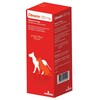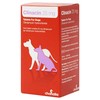Clinacin
Clinacin Tablets are for the treatment of infected wounds, abscesses, superficial pyoderma and oral cavity/dental infections caused by or associated withclindamycin-sensitive staphylococci, streptococci, bacteroidaceae, Fusobacterium necrophorum, Clostridium perfringens and osteomyelitis caused by Staphylococcus aureus. They can also be used to help provide antimicrobial cover during dental procedures.
Clinacin Tablets are white in colour with break lines on one side for easy and accurate dosing.
Clinacin 300mg Tablets for Dogs
£1.15Clinacin Tablets are indicated for the treatment of infected wounds, abscesses, superficial pyoderma and oral cavity/dental infections. Clinacin Tablets are grilled meat flavoured for...[More info]
Clinacin 25mg Tablets for Dogs
£0.32Clinacin 25mg Tablets are indicated for the treatment of infected wounds, abscesses, superficial pyoderma and oral cavity/dental infections. Clinacin Tablets can also be used to help...[More info]
Contra-indications, warnings, etc
Clinacin 25mg, 75mg and 150mg
Do not administer to animals with hypersensitivity to clindamycin and lincomycin preparations. Do not administer to rabbits, guinea pigs, chinchillas, hamsters, horses or ruminants.
Before use of Clinacin tablets, the identification of causative pathogenic micro-organisms should be carried out and their susceptibility to clindamycin should be established.
Clindamycin and lincomycin show parallel-resistance. There is a partial cross-resistance to erythromycin and other macrolide-antibiotics.
Symptoms of overdose include vomiting, inappetence and diarrhoea. In such cases, treatment should be stopped immediately, and the dogs treated symptomatically.
Clindamycin sometimes causes the overgrowth of non-sensitive organisms such as resistant clostridia and yeasts. In cases of superinfection, appropriate measures should be taken according to the clinical situation.
Vomiting and diarrhoea are observed occasionally.
During prolonged therapy of one month or greater, periodic liver and kidney function tests and blood counts should be performed. Patients with severe renal and/or very severe hepatic disturbances accompanied by severe metabolic aberrations should be dosed with caution and should be monitored by serum examination during high dose clindamycin therapy.
While high dose studies in rats suggests that clindamycin is not a teratogen and does not significantly affect the breeding performance of males and females, safety in gestating bitches or breeding male dogs has not been established.
Neuromuscular blocking effects have been observed with clindamycin possibly leading to an increase of efficacy of other neuromuscular blocking agents. The concomitant use of such drugs must be handled with care.
Clinacin 300mg Tablets
Clinacin Tablets are contra-indicated in animals hypersensitive to clindamycin or lincomycin preparations.
Do not administer to rabbits, guinea pigs, chinchillas, hamsters, horses or ruminants.
Clindamycin should not be used concomitantly with chloramphenicol or macrolides as they may antagonise each other at their site of action.
Clindamycin sometimes causes the overgrowth of non-sensitive organisms such as resistant clostridia and yeasts. In cases of superinfection, appropriate measures must be taken according to the clinical situation. Vomiting and diarrhoea have occasionally been observed.
If you notice any serious effects or other effects not mentioned in this leaflet, please inform your veterinary surgeon.
Clindamycin and lincomycin show parallel resistance.
Partial cross-resistance has been demonstrated between clindamycin, erythromycin and other macrolide antibiotics.
Before use of Clinacin tablets, the identification of causative pathogenic micro-organisms should be carried out and their susceptibility to clindamycin should be established.
Clindamycin has been shown to have neuromuscular blocking properties that may enhance the action of other neuromuscular blocking agents. CLINACIN TABLETS should be used with caution in animals receiving such agents.
During prolonged therapy of one month or greater, periodic liver and kidney function tests and blood counts should be performed. Patients with severe renal and/or very severe hepatic disturbances accompanied by severe metabolic aberrations should be dosed with caution and should be monitored by serum examination during high dose clindamycin therapy.
While high dose studies in rats suggest that clindamycin is not a teratogen and does not significantly affect the breeding performance of males and females, safety in gestating bitches or breeding male dogs has not been established. Therefore, the administration of the veterinary medicinal product during pregnancy and lactation should be the subject of a benefit/risk assessment by the veterinarian.
The bioavailability of the product is higher in fasting dogs compared to non-fasting dogs. Symptoms of overdose include vomiting, inappetence and diarrhoea. In such cases, treatment should be stopped immediately, and the dogs treated symptomatically.
General precautions
For animal treatment only.
Keep out of the reach of children.
Pharmaceutical precautions
Any unused veterinary medicinal product or waste materials derived from such veterinary medicinal products should be disposed of in accordance with local requirements.
This veterinary medicinal product does not require any special storage conditions.

